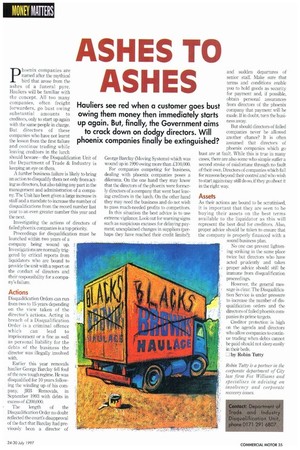ASH AS S TO HES
Page 37

If you've noticed an error in this article please click here to report it so we can fix it.
phoenix companies are named after the mythical bird that arose from the ashes of a funeral pyre. Hauliers will be familiar with the concept. All too many companies, often freight forwarders, go bust owing substantial amounts to creditors, only to start up again with the same people in charge. But directors of these companies who have not learnt the lesson from the first failure and continue trading while leaving creditors in the lurch should beware—the Disqualification Unit of the Department of Trade & Industry is keeping an eye on them.
A further business failure is likely to bring an action to disqualify them not only from acting as directors, but also taking any part in the management and administration of a company. The Unit has been given a large increase in staff and a mandate to increase the number of disqualifications from the record number last year to an even greater number this year and the next Investigating the actions of directors of failed phoenix companies is a top priority Proceedings for disqualification must be launched within two years of a company being wound uP. Investigations are normally triggered by critical reports from liquidators who are bound to provide the unit with a report on the conduct of directors and their responsibility for a company's failure.
Disqualification Orders can run from two to 15 years depending on the view taken of the director's actions. Acting in breach of a Disqualification Order is a criminal offence which can lead to imprisonment or a fine as well as personal liability for the debts of the business the director was illegally involved with.
Earlier this year removals haulier George Barclay fell foul of the new tough regime. He was disqualified for 10 years following the winding up of his company, JRB Removals, in September 1993 with debts in excess of £200,000.
The length of the Disqualification Order no doubt reflected the court's disapproval of the fact that Barclay had previously been a director of George Barclay (Moving Systems) which was wound up in 1990 owing more than .E100,000.
For companies competing for business, dealing with phoenix companies poses a dilemma. On the one hand they may know that the directors of the phoenix were formerly directors of a company that went bust leaving creditors in the lurch. On the other hand they may need the business and do not wish to pass much-needed profits to competitors.
In this situation the best advice is to use extreme vigilance. Look out for warning signs such as suspicious excuses for delaying payment; unexplained changes in suppliers (perhaps they have reached their credit limits?); and sudden departures of senior staff. Make sure that terms and conditions enable you to hold goods as security for payment and, if possible, obtain personal assurances from directors of the phoenix company that payment will be made. If in doubt, turn the business away But should directors of failed companies never be allowed another chance? It is often assumed that directors of bust are at phoenix companies which go fault. While this is true in many cases, there are also some who simple suffer a second stroke of misfortune through no fault of their own. Directors of companies which fail for reasons beyond their control and who wish to start again may still do so, if they go about it in the right way.
As their actions are bound to be scrutinised, it is important that they are seen to be buying their assets on the best terms available to the liquidator as this will represent the best deal for creditors. Also, proper advice should be taken to ensure that the company is properly financed with a sound business plan.
No one can prevent lightening striking in the same place twice but directors who have acted prudently and taken proper advice should still be immune from disqualification proceedings.
However, the general message is clear. The Disqualification Service is under pressure to increase the number of disqualification orders and the directors of failed phoenix companies its prime targets
creditor protection is high on the agenda and directors who allow companies to continue trading when debts cannot be paid should not sleep easily in their beds.
LJ by Robin 'rutty
Robin Tutty is a partner in the corporate department of City law firm Fox Williams and specialises in advising on insolvency and corporate recolvry issues.








































































































